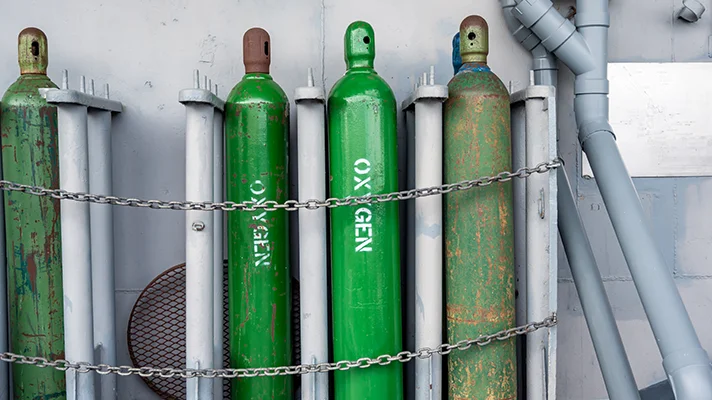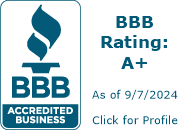Secure your future with Business Insurance!
Compressed Gas Cylinder Storage and Handling

Compressed gas cylinders — whether it’s just one cylinder, or multiple units — are widely used in manufacturing and commercial operations. Oxygen and flammable gas cylinders stored alone present a lesser hazard than when stored together, where they can feed off each other if there’s something wrong. While oxygen is not flammable, an oxygen leak can turn a small fire into a major problem as it feeds oxygen to the fire. Unsecured cylinders can rocket into people or through walls if they tip over, suffer damage to the valve, and release contents under high pressure.
The following guidelines cover standard cylinder storage. Bulk storage or storage of large containers have more specific guidelines that must be considered. Make sure your fuel or gas vendor or contractor is qualified to provide you with the proper equipment and help. The primary guidelines regarding cylinder storage are to:
Keep oxygen and fuel gases properly separated while in storage.
Label cylinders properly to avoid misidentification.
Control ignition sources around fuel gas cylinders to prevent overheating or ignition.
Protect cylinders against physical damage to prevent leaks.
The following general rules apply to all cylinder storage. Reference the National Fire Protection Association 58 Liquified Petroleum Gas Code or appropriate OSHA codes for more information.
Train employees regarding storage, handling, and connection of cylinders. Untrained people should not handle cylinders at all.
Oxygen must be stored at least 20 feet from fuel gas cylinders or other highly combustible material. This includes, but is not limited to: Acetylene, grease, oil, or flammable gases.
Do not store oxygen closer than 20 feet from fuel gas cylinders or highly combustible material, unless it is separated by a noncombustible wall. The wall must be at least 5 feet high and have a fire resistance rating of at least 30 minutes. The wall must also be wide enough to extend past the cylinders to protect against horizontal flame spread.
Store cylinders away from heat sources.
Cylinders must be secured and stored where they will not be struck and tipped over. Use a chain, bracket, or other restraining device at all times to keep cylinders from falling.
Any cylinder in storage that is not being used must have a protective cap in place, even if empty.
Post “No Smoking” signs around all storage areas.
Store cylinders in well-ventilated areas. Do not store cylinders where they will block an exit, near heat sources, or in basements or pits.
The storage area must be posted with names of the individual gases in the cylinders. Warning signs should also be posted against tampering by unauthorized employees. Use bilingual signs if you have non-English speaking employees.
All cylinders must be properly labeled to avoid confusion regarding contents.
Use only cylinders and tanks that are provided by a qualified contractor.
Use proper carts to transfer cylinders and make sure that all cylinders are secured against tip over when being transferred. Don’t lift cylinders with magnets, hooks, ropes, or slings. They can only be lifted using cradles or enclosed platforms.
Store cylinders upright, and never on their sides.
Don’t drop, drag, or roll cylinders.
Never use a hammer to open a valve or loosen a cap. If the cylinder does not have a wheel to open and close the valve, then a key, handle, or non-adjustable wrench must be on the cylinder stem while in service. A way to quickly shut down the cylinder should be provided.
Download This Article
Additional Safety Topics
Insurance Solutions for a Wide Range of Businesses
From contractors to coffee shops, we offer insurance designed for many types of businesses, including:
Specialty Insurance
Commercial Auto Insurance Workers' Compensation Insurance Manufacturing Insurance Agribusiness Insurance Insurance for WineriesConstruction and Contracting
General Contractor Insurance Carpenters Insurance Plumbing Insurance Excavator Insurance Electrician Insurance HVAC Business Insurance Lawn Care Business InsuranceRetail and Service
Retail Business Insurance Grocery Store Insurance Pharmacy Insurance Barber Insurance Pet Grooming Insurance Florist Insurance Bakery Insurance Photographer Insurance Beautician Insurance Coffee Shop Insurance Funeral Home Insurance Janitorial InsurancePolicyholders can request access to our On-Demand Video Training Service, which includes over 5,000 high-quality safety and human resource training videos. This service is provided at no cost to our policyholders.
View the Streamery Training Courses that are Available To get access to a Streamery course, contact your Hastings agent.

Monnit Remote Monitoring Solutions is offering Hastings policyholders a 20% discount on hardware and a 40% discount on software and connection services.
Monnit provides wireless IoT sensor solutions for remote monitoring across industries, offering real-time data tracking for temperature, humidity, motion, water detection, and more to help businesses optimize efficiency and prevent costly issues.
Secure your future with Business Insurance!
Hastings Insurance Company
404 E. Woodlawn Ave.
Hastings, MI 49058
Monday-Friday
8:00 a.m. - 4:30 p.m. (EST)
(800) 442-8277
Terms of Use and Privacy Statement© Hastings Insurance Company. All rights reserved.



